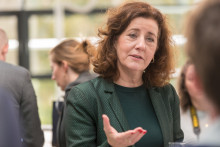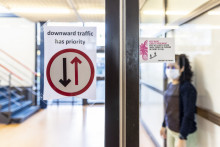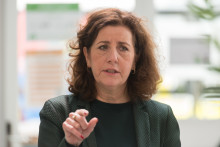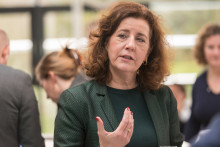The above was discussed Wednesday afternoon during a parliamentary debate on the topics of coronavirus and higher education. The Minister emphasised once again that the end goal was not for institutions to organise education in the evenings and on weekends, although she did say it was an option.
Join the discussion
Jan Paternotte (D66) wondered whether students would have to pay their own public transport tickets if they are required to come to campus on weekends. Excellent question, said the Minister. ‘Students have to be able to get to class.’
Minister Van Engelshoven is calling on degree programmes to properly involve participation bodies in the creation of timetables for the period after the summer holidays. A different stance than the one taken by the Minister at the height of the coronavirus crisis, when she stated that participation bodies could also be involved at a later date. ‘But we are now past the peak’, the Minister said in parliament. ‘The time has come to make full use of participation bodies.’
Large group
Students who graduate from a university Master’s programme or a university of applied sciences between September 2020 and the end of January 2021, will receive a refund on three months of tuition fees. MP Frank Futselaar (SP) wanted to know why this scheme does not apply for university Bachelor’s students.
‘In a time when a lot of special schemes are required, we need to focus on helping out the largest group possible’, said the Minister. She believes most university students will continue with a Master’s programme after obtaining their Bachelor’s degree. They will receive compensation in the form of exceptional admission, meaning that they will be able to start their Master’s programme before obtaining their Bachelor’s degree, which allows them to make up for any delays.
Mr Futselaar objected that around 20 percent would not be enrolling in a Master’s programme. ‘I think that’s a pretty large group.’ Although the Minister admitted the argument was valid, ‘there was no other option within the limited financial scope available to me’, she said.
No small amount
Mr Futselaar had a practical question about the previously-mentioned exceptional admission. How are students supposed to combine completing a Bachelor’s in Groningen with a Master’s in Maastricht, for example?
The Minister said that’s a job for the institutions. She will be asking institutes of higher education to ensure a smooth transfer for students completing Bachelor’s degrees while starting their Master’s programmes.
PvdA MP Kirsten van den Hul wanted to know if institutions have the means available for this purpose at this time. Perhaps the government should invest more funds? Van Engelshoven responded that the Ministry of Education, Culture and Science had received an additional half a billion for education. ‘That’s no small amount. But even so, we needed to make choices.’ The guidance of students in vulnerable positions is part of the institutions’ duty of care, she said. In the coming period institutions will also be carefully monitored to ensure financial issues are avoided.









